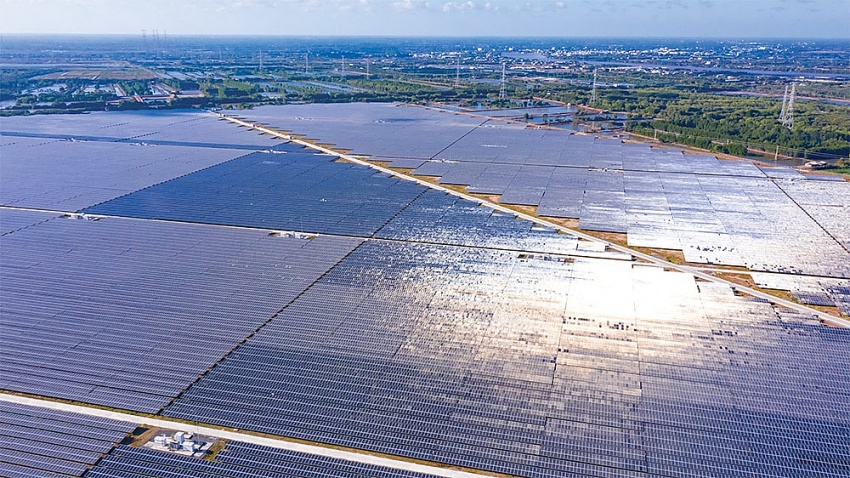
The growth rate of the rooftop solar market in Vietnam is considered one of the fastest-growing segments in terms of new installed capacity in the next 10 years.
With that, the Vietnamese government is promulgating policies to encourage the installation of rooftop solar power systems in industrial parks (IPs). After a meeting on the issue on April 10, Deputy Prime Minister Tran Hong Ha assigned the Ministry of Industry and Trade (MoIT) to coordinate with the Ministry of Justice and relevant agencies to develop a decree stipulating policies to encourage rooftop solar development, to be installed in homes, offices, and IPs.
The MoIT is also assigned to coordinate with relevant ministries and sectors as well as Vietnam Electricity to develop a set of model documents that specifically stipulate standards, technical regulations, and state management requirements in encouraging the development of rooftop solar power. The mechanism is expected to be implemented in the spirit of transparency and openness.
Apple supplier Foxconn is on the journey to install a rooftop solar power system for its factories with a total capacity of 32MWp, accounting for 20 per cent of Foxconn’s current factory roof area in Vietnam. From June 2023, it has successfully operated 19MWp of rooftop solar capacity for its factories in the northern province of Bac Giang.
Several global manufacturing giants such as Samsung and LG are following Foxconn’s path and plan to announce specific energy transition plans in Vietnam. Additionally, other outsourcing manufacturers for Adidas, Nike, and other apparel and footwear brands have also recently actively switched to rooftop solar.
Chung Dieu Tuan, CEO of foreign-invested enterprise CME Solar, said, “The main market driver is the increased demand for rooftop solar installations in the manufacturing sectors of foreign-invested enterprises in Vietnam, especially the electronics/ semiconductor and textile industries. As part of the global effort to commit to net-zero emissions, international brands and manufacturers in Vietnam must meet the energy transition requirement to renewable sources.”
CME currently boasts rooftop solar power systems for a series of domestic and foreign-invested groups, such as Hwaseung Vina, an Adidas research and development centre, CJ Vietnam, Puratos Grand-Place Vietnam, Nam Dinh Vu Industrial Park, and Song Hong Garment JSC, among others.
These moves are expected to help realise the target that by 2050, 80 per cent of factories will install rooftop solar power systems, and the ratio for houses and office buildings is 20 per cent.
A Savills 2022 report stated that the total industrial and commercial roof area is about 80,000 hectares and the estimated annual growth rate is 10 per cent, while the total roof area used for the production of solar energy accounts for only 8 per cent.
Statistics from the Vietnam Energy Partnership Group show that as of June 2023, the total installed capacity of solar farms and rooftop solar power is estimated at 8GW, much higher than the 1GW witnessed at the end of 2020.
The market demand for low-emission products is both a pressure and a driving force pushing IPs and tenants to change and shift towards a circular economy, towards sustainable development. Thus, currently, businesses in various industries are in dire need of incentives and procedures to develop rooftop solar power.
Truong Van Cam, vice president of the Vietnam Textile and Apparel Association, said, “Installing rooftop solar power is in line with the state’s policy of reducing energy from fossil fuels, reducing greenhouse gas emissions, and implementing the net-zero commitment by 2050. In addition, it also meets requirements in many other garment and textile markets, which require products with a green origin and using renewable energy.”
The textile and garment industry has around 1,200 businesses with over 600,000 workers located in IPs. Currently, about 30-50 per cent of businesses depending on the region have installed rooftop solar power, Cam said.
“Besides the problem of disposing of solar panels, there is also the problem of waste treatment and how to recycle it so as not to be a burden on the environment. Thus, there will soon need to be specific regulations on purchasing and using rooftop electricity in IPs and economic zones,” he added.
According to Deputy Minister of Planning and Investment Nguyen Thi Bich Ngoc at a forum on promoting the sustainable development of IPs in mid-April, the transition towards green energy is a key factor in increasing competitiveness and ensuring sustainable development for each IP, locality, and the overall economy.
In Vietnam’s 16 free trade agreements and negotiation of several others, requirements on clean and green production stages are critical so that businesses can participate in demanding markets. Additionally, the goal of sustainable industrial development has been included in the United Nations’ sustainable development commitments.
Nguyen Thi Kim Lien, chemical and environmental expert:
The circular economy in general and industrial symbiosis (IS) in particular offers wins for economic cost savings, environmental benefits, and social impact.
Vietnam has the potential to establish a circular economy as well as IS thanks to a high number of industrial parks (IPs) throughout the country.
The IS is present in four out of five circular business models. There is a pretty high potential for IS due to the diverse types of industries in selected parks under the Global Eco-IP Programme.
The other factors are the high number of IPs with a pretty similar composition of tenant firms high potential of IS, and the fast growth of disruptive technologies (digital, physical and biotechnology) for the implementation of IS and the circular economy.
In addition, the readiness of stakeholders for realisation of these is rising. Despite the potential, there are lack of financial and economic invention for business in executing IS.
The investment procedures for renewable energy projects are too complicated, and there are a lack of policies to support university/research institution engagement in renewable energy development for some projects.
The policies to reuse and recycle waste are also not sufficient enough for the promotion of the recycling industry, while complicated procedures for reuse and recycling of waste, particularly waste being sent outside the company, is also an issue. In addition, there is a lack of information regarding the market for exchangeable secondary materials and by-products.
Furthermore, extended producer responsibility modulated fees should be issued in order to ease business compliance.
Reusing of treated wastewater, bioenergy, and sludge also faces barriers due to a lack of technical guidance or standards for reuse and recycling of treated wastewater used for gardening. This is because input water in business processes and services lacks an adequate feed-in tariff system for bio-energy.
In addition, there is a lack of policy for promoting the use of sludge with high nutrient contents in fertiliser production.
Truong Khac Nguyen Minh, deputy general director KCN Vietnam Group:
KCN Vietnam is developing ready-built factories and warehouses to meet demand. We will try to get LEED certification for the factories, as it is the world’s most widely used green building rating system.
Besides that, we will also try to apply the quality framework on ESG and target to install rooftop solar power for our entire factory system to contribute to the national greenhouse gas emissions targets. During the design process, KCN Vietnam focused on using environmentally friendly construction materials, and optimised functions to lower emissions and save energy.
In addition, we also design complex areas so that tenants can take advantage of infrastructure functions, and they can establish symbiotic relationships. We have also built strong, long-term partnerships with suppliers and consultants.
Thus, KCN Vietnam can also provide consultancy services for tenants towards efficient use of resources, cleaner production, and industrial symbiosis, which helps save energy and simultaneously create better conditions for their export activities.
The primary vision and mission of KCN Vietnam centre on becoming a reliable and strategic ally for both local and global investors. This commitment comes to life by offering superior, custom-built warehouses and factories while maintaining an unwavering focus on delivering exceptional customer service.
Oanh Nguyen




